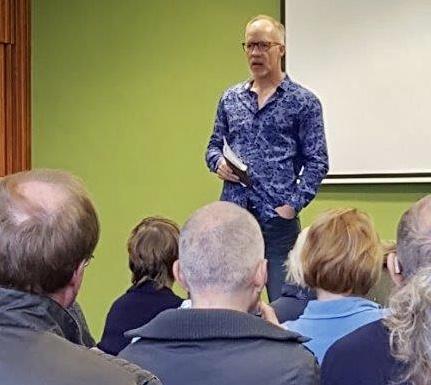Prepare yourself for a shock.
This could be the most cultural blog I have ever written.
But please don’t fear. It will still be useful - hopefully - just unusually enlightened.
What am I talking about now? you’re probably once again finding yourself asking.
The answer is this:
One of the biggest problems people tell me about in their public speaking and presentations is how to use their voice effectively.
By which I mean how to keep the audience involved and entranced, and make sure they understand everything you say.
By the way, I chose the picture from one of my book talks as at least it looks like the group are reasonably interested!
The voice is an amazingly subtle instrument in aiding understanding, something which is often underappreciated.
For example, take this sentence:
All animals must be kept at the back of the train
How many meanings could that sentence have? Think about it for a moment.
If I saw it in print, I wouldn’t understand what it meant. And why?
The reason is the sentence has six possible meanings, depending on which word you emphasise.
Emphasise the all, and it means every single animal, rather than just some must be kept at the back of the train.
Put the emphasis on animals, and it means not the fruit and veg, or the electronic goods, but the animals must be kept at the back of the train.
Similarly with must: it’s not optional, it’s obligatory to keep the animals at the back of the train.
On top of which kept, back, and train could also make for different meanings, depending on which words were emphasised.
In total, six possible meanings in one short sentence.
That’s the power of the voice.
The most important point in making sure an audience understands your meaning is to know exactly what you mean yourself.
This sounds basic, but you wouldn’t believe the number of times I see presenters trying to explain something which they clearly don’t understand themselves.
And if they don’t get it, how will the audience?
It’s something I used to see a lot in my BBC days, by the way.
Reporters who had no idea what it was they were actually trying to report, and the results were painful.
More like a crossword clue than clear and insightful journalism.
So, the question is:
How to make sure you emphasise the right words, and guide your audience through your story, keeping them with you at every turn?
This is where the blog gets intellectual, or as near as I can ever manage anyway.
My answer is poetry.
Yes, you did read that right.
I'm going to talk about poetry.
How unlikely is that?
It's as probable as finding a llama in your fridge, quoting Shakespeare every time you open the door, or some such.
But bear (or llama) with me here.
There is a method in this madness.
Many years ago, when I was first learning how to read a radio or TV script properly, to ensure my meaning was clear I started reading poems.
As they're written to be read aloud, and poets are masters of subtle meanings, poems are ideal for practicing your public speaking and presentations.
Try it. First of all, find a favourite poem.
If you don’t have one, or you would like to try something new, here are three of my favourites:
- Hell Gate, AE Housman
- This Be The Verse, Philip Larkin
- Wessex Heights, Thomas Hardy
Read them quietly to yourself so you understand what the poet is trying to say, or think you do, anyway.
Now read them out loud.
Start to explore which words should be stressed, and those that should be run together.
Where there should be pauses, where there should be increases in volume, and parts where you go quieter.
Run through a few times, and you’ll soon find yourself understanding the art of the spoken word.
It's a simple, but effective and enjoyable trick for mastering the power of the voice.
Finally, a masterclass in how it’s done.
This is one of my favourite speeches of all time, from 1963, West Berlin, as it then was, and the height of the Cold War.
Watch how John F Kennedy repeats one specific phrase in his legendary Ich bin ein Berliner speech, but the difference in emphasis and intonation means every single time it has a slightly different meaning, and never fails to make the skin tingle.
By the way, if you've got a favourite poem which I haven't mentioned, do let me know.
Not just for the practice of public speaking, but also because I love a good recommendation.
